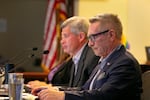Two Portland city commissioners are considering minimizing their bureaus’ shared budget woes with a new bond measure.
Commissioners Dan Ryan and Rene Gonzalez have joined forces to evaluate the public’s interest in a November 2024 ballot measure that would raise property taxes to bankroll projects in the city’s parks and fire departments. This proposal was first reported by Willamette Week.
Portland Parks & Recreation has delayed critical maintenance projects at city parks for years due to funding shortfalls. The bureau now estimates the cost to repair all deteriorating park infrastructure to come in at over $600 million. Years of budget cuts have also hindered Portland Fire & Rescue, which has similarly kept the department from repairing old, structurally unsafe buildings and forced a hiring freeze early in 2023.

FILE: Portland City Commissioners Rene Gonzalez and Dan Ryan make final preparations for a City Council public work session last July.
Caden Perry / OPB
The prospect of another year of expected budget constraints has Ryan, who oversees the parks bureau, and Gonzalez, who controls the fire department, searching for new revenue streams to keep their cash-strapped bureaus afloat.
“Our public safety infrastructure has faced substantial underinvestment for years, and I am dedicated to ensuring we position the city of Portland to once again be one of the safest cities in America,” said Gonzalez in a press release. “At the same time, with strategic investments in parks, we have the potential to galvanize smart public/private partnerships to position the city for the next 20 years and keep Portlanders playing.”
In November, the parks and fire bureaus polled 780 Portland voters on their support of a potential tax measure to close their budget gaps.
Of those polled, 62% expressed interest in a $800 million bond that jointly funded maintenance and new construction projects within the parks and fire bureaus. That hypothetical bond would be funded by a property tax, that would cost the average residential property owner about $200 annually.
Respondents were less interested in a standalone parks funding measure: Just over half of those polled supported a $600 million parks bond. The poll did not propose a bond that would solely fund fire bureau infrastructure projects.
The Fire Bureau previously reversed a plan to place a bond measure on the May 2022 ballot after polling revealed little voter appetite for the proposal.
The poll also analyzed voters’ interest in renewing the existing parks levy, which accounts for about one-third of the parks bureau’s budget. That five-year levy — which costs average homeowners about $150 a year — is set to be renewed in 2025. Seventy percent of voters polled said they would support the levy renewal.
The parks bureau has been supported by another bond for the past decade. The Parks Replacement Bond, a measure passed in 2014, provided up to $68 million for repairs and maintenance on parks buildings. That money had all been spent by 2021, and construction on the final bond-funded project is expected to wrap early in 2024.
Commissioners plan on spending the next few months collecting more public feedback on a bond measure. They would need to land their fellow commissioners’ support by August to refer a new tax to the November ballot.
The proposal comes at a moment in time where public interest in new taxes is particularly low.
Mayor Ted Wheeler has long warned his colleagues against introducing news taxes, pointing to data suggesting that high taxes have kept businesses from investing in Portland. In May, he floated a plan to place a freeze on nearly all city taxes and fees for at least a year.
Last month, Gov. Tina Kotek unveiled a set of recommendations meant to revitalize downtown Portland, inspired by business owners, local politicians, and other city leaders. A top recommendation called on elected officials to hold off on any new taxes or fees until the end of 2026, at least.
And in the November poll commissioned for the fire and parks bureau, 52% of respondents said the main reason they would reject a new bond would be because of their opposition to new taxes.
This strong disinterest is driving commissioners’ hesitation around a new tax.
“We know Portlanders are experiencing significant tax burdens, so we need to balance existing taxes with new bond measures,” said Ryan. “Portlanders must have their voices heard in what services they want and how they want their public resources invested.”





